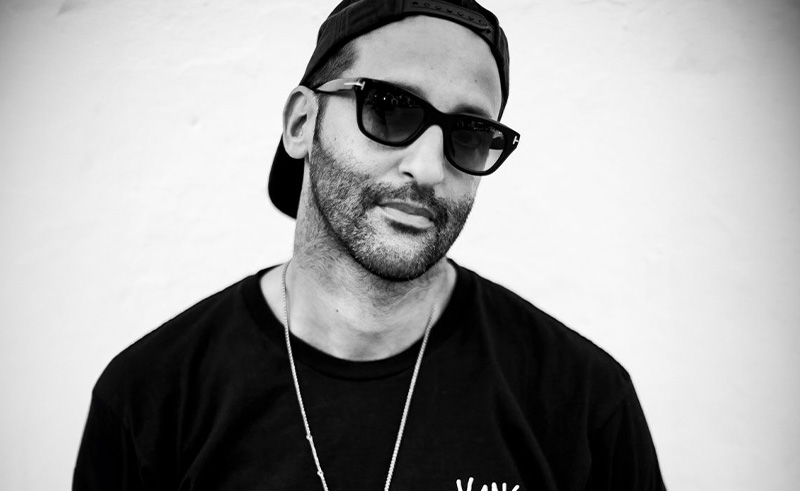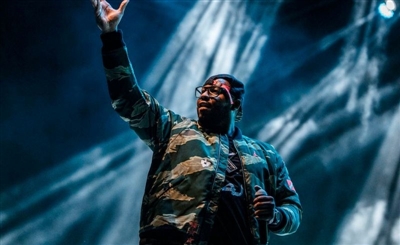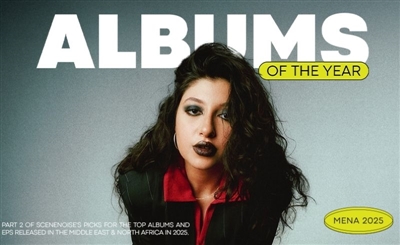Rockin Moroccin - The Power of North African Rhythm on Any Dance Floor
From the dance floor to the shower, Rockin Moroccin's fusion of heritage and house music seeks to inspire joy across all walks of life.

It was during a Eurostar train ride that Rockin Moroccin truly understood the power of his music and its role in uplifting spirits.
Engrossed in a spontaneous production session, headphones locked in and ears looped in, Nabil, or more commonly known as, Rockin Moroccin, was surprised when a nun approached him, curious about the strange wavelengths emanating from his computer screen and inquired about his profession. Torn between disclosing the truth and opting for a more subdued profession, the artist decided to reveal his true career: “I’m a DJ, I make music and I’m performing tonight.”
The nun responded “You know what, you make people happy and your job makes people happy, keep doing what you do,” before she went on about her path, leaving a bewildered Nabil behind.
Indeed, this is precisely the effect that Rockin Moroccin’s music has on its audience. Raised in London but originally Moroccan, the producer crafts tracks rich in colour, percussive melodies and bouncy rhythms.
His hit remix, ‘You Got the Love’ took the world by storm after being picked up by the Keinemusik crue, despite an initial hesitation about its release. However, Rockin Moroccin’s repertoire extends far beyond the single, revealing a treasure trove of intricate and layered tracks, which entwine his Moroccan heritage with house and melodic genres. From his earliest encounters with music to his ongoing mission to integrate his cultural heritage into his sonic identity, we had the privilege of speaking with Rockin Moroccin, delving into the vibrant spirit that fuels both him and his music…
From his earliest encounters with music to his ongoing mission to integrate his cultural heritage into his sonic identity, we had the privilege of speaking with Rockin Moroccin, delving into the vibrant spirit that fuels both him and his music…
You were immersed in music from a very early age, being exposed to vinyl culture in London to playing various parties throughout your early adulthood. Can you talk a bit more about what initially drew you to music and what kept you hooked?
My parents owned a clothing shop in London, catering to many Moroccans and immigrants from around the world. Inside one of the larger shops, there was a space that never, for some reason, was easy to rent. It was kind of like a mezzanine, so my parents would try to rent it out to different merchants, kind of like a market.
And so this one guy offered to rent it and set up a small vinyl store, and it became very popular especially for drum and bass enthusiasts. And the first time I heard that music, I was like, "What is this music? What is going on?" And so when it was empty or when they were closing down, I would get behind the desk where the decks were and ask "How does this work? What's this button for? What's that do? What is this? What's that?" Over the years I started learning. And then soon after I would buy records, I eventually became the kid at school who knew how to DJ. So yeah, that's how it started. Loved it.
That's what initially drew you into discovering, digging music, and vinyl. What do you think lured you into production and actually making and crafting your own music?
Honestly, I was never attracted to production. I always loved finding new music and the DJ-ing side of it. The production side came more from being a little bit frustrated with certain tracks and thinking, "Oh, this track’s really good, but it should have had this here, right? Man, this would be great if the kick started at this point. Why did the drop sort of stop and then start?” And then being like, "Okay, well, let me stop being frustrated by that."
So I worked with producers, shadowing them and watching what they did, asking them to help me with stuff. And it was just crafting track after track of just, for lack of a better word, garbage. But the funny thing is, I go back to these old tracks that I first started and I kind of use them as a template, as a springboard to start new tracks sometimes, because the ideas were great, but I didn’t have the know-how or the ability to complete them back then.
You blend a lot of different genres such as percussive, melodic, tribal - what would you describe as your trademark sound?
When you're starting off, you kind of follow other musicians or producers that you look up to, and you take a little bit from there and everywhere… And then if you're lucky, eventually after taking from all these other artists and producers, you'll find your own personal sound, and I think that's what happened to me. It took me a long time, but I think I'm in a comfortable place. I'm making music that feels good to me. Some tracks might feel melodic, sometimes it might feel a little bit more percussive, or even break-beaty and sometimes it’s how I feel, and what's happening at that time in my life.
You have a very strong Moroccan heritage, hence your stage name. How do you integrate that heritage into your music - especially in tracks like ‘Oud In C Minor’, ‘Bayati Shiraz’ etc…?
I'm definitely attracted to North African and Middle Eastern instruments. They've been imprinted on me from a very young age. Like the darbuka or the bendir: percussions are very powerful. There's something primal about them, whether you're from South Africa or Northern Scandinavia, the rhythm of percussion speaks to something deeply ingrained in human nature. And so when I'm producing a track, these instruments are my favourites to work with. As a DJ, I've noticed their impact firsthand - a powerful drum solo can captivate a crowd, almost hypnotically. And that's also why they're my favourite, because of their unique sound and craftsmanship.
But integrating that into a set is tricky. When using plugins, the sound can feel too polished. Imperfections, like slight tempo variations, add character and depth to the music, making it more appealing to the ear. So yes, these instruments are my top choice, and I'm particularly drawn to the Middle Eastern and North African varieties. Can you talk about your track ‘Sendeya’, and how it was like sampling sounds from the Moroccan Gnawa tribe, along with the research and production process?
The Gnawa tribe are a very special and big part of Moroccan culture and history. They came from the south of Morocco and West Africa and settled there. In terms of language, and when they sing, it's in a dialect that the general population of Morocco doesn’t understand.
I was in Marrakech with Davide Ruberto, an amazing producer who I did the track with, and we were walking around in the main Medina and we came across these singers. And Davide was so captivated and curious about them: “What do they do, what are they singing about?” And I was like to be honest, I don't know either, so then we came up with the idea. “Let's sample then let's get them to the studio.”
Eventually we found some of them and we got them to the studio and they sang for us. We asked them, what is this about? And it was actually kind of sad. It was about longing for home, missing their mothers and their fathers. In producing this track we really wanted to do that sample justice, because when you see them live, it’s extremely touching and powerful - it’s a great tribe, a great people and great musicians.
Now, let's discuss you as a performer. You've graced some of the largest stages out there. What's been your standout music festival experience, and what elements contribute to making a great music festival?
I'd have to say my favourite experience was at Burning Man last year, specifically at the Max Art Camp on the Art Car with Carlita. It was unique because, unlike previous years, the lineup wasn't advertised, so people were there purely for the experience, not knowing what to expect. The crowd was incredible, although I can't recall exactly what I played.
Another memorable event was in London, at the Warehouse Events with Who Made Who and Jan Blomqvist. Witnessing them perform live was so inspiring, and I have immense respect for their craft. Playing with Who Made Who in Dubai at Soho Gardens was unforgettable, with such a receptive audience and an incredible vibe.
However, the most visually stunning event was for a friend's birthday celebration outside Beirut, in Faraya, against the mountains. The setting was breathtaking, with rock faces surrounding us, candles, lasers, and lights illuminating the night. Lebanon truly knows how to throw a party, and it was such a memorable experience, and the Lebanese certainly know how to infuse spirit into their celebrations. Which tracks of yours are you the proudest and which releases of yours were truly impactful?
Which tracks of yours are you the proudest and which releases of yours were truly impactful?
Well, it would have to be ‘You Got the Love’, and funnily enough, it was never even meant to be released. It was done for myself, kind of out of boredom, between that period of Christmas and New Year where you're kind of stuck. And so I made it very quickly and forgot about it. And I was playing in Costa Rica, when my manager, who loved the track, made me play it. He recorded a video, posted it, and then, all these artists started asking him for it, and I was like, "Really, really? They like it?" That's how it kind of grew, and it definitely has the most impact because I'm still getting messages about it to this day, and it's been over a year since it's been released.
I don't produce music that's necessarily for the dance floor. I like to produce music that’s played in the bedroom, that's played while you're in the shower, that's played in the car, that's played in the living room while you have friends over, and that can also be played on a dance floor. Because if I can listen to it on the dance floor, then I can definitely listen to it in my daily routine.
What does your production process look like? From formulating an initial idea to transforming it into an actual track?
My process definitely doesn't start by me suddenly coming up with a melody, humming it like in an airport lounge or something, out of the blue, for me personally, it doesn't work like that. It comes from other music, the music I know: I’ll hear something, and I say, "Wow, that beat is sick," you know, "Oh my god, you know, this is really special, you know, I've got to do something similar." And I play around with different ideas that I've heard from other producers, and mix around with them, and then you might make a mistake, but that mistake is something that you end up going with.
The latest track that I produced, being released on Get Physical in March, it's going to be called ‘Touch’. It came from an old track that I always loved, but I could never play because it was in drum and bass. But I loved the vocals and I was like, "Okay, let me work with that." You need a foundation to start on something. And then I played around with it for a little bit, wasn't happy with it, shelved it, started working on other stuff, you know, circle back to it a few months later, take it off the shelf.
What do you seek to accomplish in the music scene, and more specifically in the MENA region? What are some things that frustrate you that you would like to change?
Certainly. The MENA region that I knew of growing up isn't the same anymore. It has accomplished so much. I remember when I was young, attending tiny raves, wishing for music lovers to experience such events in beautiful settings like we have now. Events in places like Dubai, Morocco and Egypt have showcased incredible hospitality and drawn thousands of people. However, one frustration is that many promoters still focus mainly on booking big-name artists rather than giving newcomers a chance to shine. While there are opportunities for up-and-coming talents, the emphasis remains on established names. What are some of your goals, and do you have any exciting releases or collaborations coming up?
What are some of your goals, and do you have any exciting releases or collaborations coming up?
One day, I was warming up for a top DJ, and I was like “Man, I’m a big fan of yours, can you give me some tips on how to succeed.” And what he told really stuck with me, saying that if I could pay my rent through this job, then I'm already successful in the industry.
My goal is to create music that lasts, something people can enjoy for the years to come. I also want my performances to leave a lasting impression on people. Overall, I aim to produce music and perform in a way that resonates with others, to create memorable experiences and for people to circle back to my music even six or seven years later.
Trending This Month
-
Dec 15, 2025
-
Dec 24, 2025






















